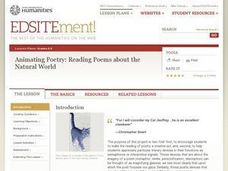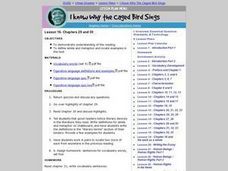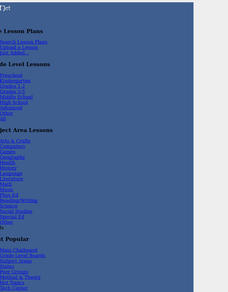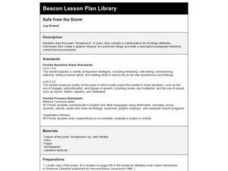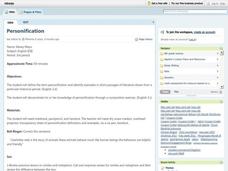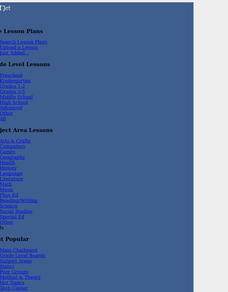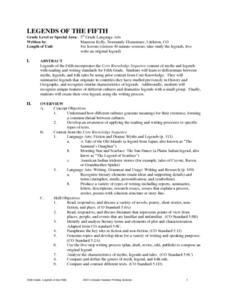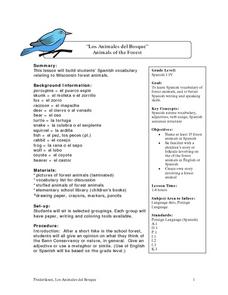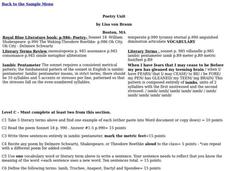Curated OER
Transcendentalism and Epiphany in Ray Bradbury's Dandelion Wine
Twelfth graders examine the characteristics of transcendentalism. In this transcendentalism lesson plan, 12th graders determine what this type of writing entails before reading a passage from, Ray Bradbury's, Dandelion Wine. They cite...
National Endowment for the Humanities
Animating Poetry: Reading Poems about the Natural World
Students complete poetry analysis activities. In this poetry analysis instructional activity, students consider the use of imagery and sound devices in poetry. Students translate poetry into another art, read a diverse selection of...
Curated OER
I Know Why the Caged Bird Sings: Chapters 29, 30
Students complete literary analysis activities for the Maya Angelou's I Know Why the Caged Bird Sings. In this novel analysis lesson plan, students read chapters 29 and 30 of the novel and complete chapter quizzes. Students write...
Curated OER
Bringing the Line to Life
Students use different types and lengths of sentences. They write with an insight of the stylistic aspects of composition. Students use precise language including adjectives, adverbs, action verbs and specific details that convey the...
Curated OER
Modern American Poetry
Students identify different types of literary terms in poems. They read different poems and create a packet summarizing them. They write a poem of their own and a biography of one of their favorite poets.
Curated OER
Safe from the Storm
Fourth graders read the poem "Snowbound" after brainstorming what a place of refuge is and why it's needed. They, in pairs, meet and write a list of ten attributes that describe a refuge. They write a paragraph describing the look, feel,...
Curated OER
A Courtin' We Will Go
Students investigate dialect in poetry as an indication of a people's culture in literature. They write a poem about dating in this era.
Curated OER
Pictures in Words: Poems of Tennyson and Noyes
Eleventh graders describe and analyze the effects of poetry on readers. They participate in an Internet scavenger hunt, an exercise involving interpretation of poetry through visual art, and an opportunity for students to create their...
Curated OER
Crafting Poetry: A Sensory Journey
Tenth graders experiment with poetry devices to write poems. In this poetry instructional activity, 10th graders participate in learning stations. Students create a word pool and select a word from the list to create a line of poetry....
Curated OER
Reading Lesson Plan
Tenth graders read the poem "Still I Rise" and discuss the different ways it can be told and read and brought to life. In this poetry lesson plan, 10th graders read aloud and silently, and compare different works of poetry.
Curated OER
Out of the Dust: Figurative Language
Learners find examples of figurative language in "First Rain" in Out of the Dust. In this Out of the Dust lesson, students takes notes on various type of figurative language and identify examples of each type in the poem.
Curated OER
Personification
Students engage in a lesson about personification. They read passages from Charlotte's Web which are connected to the concept of looking for key words to name the character. Students review the definition of personification, and write a...
Curated OER
Recognizing Similies: Fast as a Whip
Students review what they have already learned about similies and begin to engage with similies on a deeper and more abstract level as they create their own.
Curated OER
Figurative Language Scavenger Hunt
Eighth graders analyze and interpret figurative language. They listen to some examples of poetry which use figurative language. Then, they divide into groups and attempt to find more examples. Finally, 8th graders write what the poet is...
Curated OER
Alliteration
Learners write and illustrate a sentence which names a letter of the alphabet. The sentence should have subject, verb, describing words, and incorporate alliterative techniques.
Curated OER
Technology-commected Folklife Lesson Plan: Fables
Students discuss ways the stories were alike and different. The teacher demonstrate how to draw a Venn diagram using Microsoft Word. They label the two circles and enter the likenesses and differences on the diagram.
Curated OER
Poetry Interpretation and Figurative Language
Fifth graders discover how figurative language is used in poetry. They read selected poems and identify the figurative language with handouts and worksheets included in the lesson. They write poems of their own using figurative language.
Curated OER
Legends of the Fifth
Fifth graders discover the difference between myths, legends, and folk tales. They summarize legends. They work together to dramatize legends and then create their own legend using the writing process. Handouts and worksheets are included.
Curated OER
Responding To Rembrandt's Work Through Poetry
Learners write poetry in response to Rembrandt's landscapes and portraits. They create accompanying illustrations based on interpretations of Rembrandt's work and present them along with the poems in book format.
Curated OER
Building a Literature Pyramid
Students create a literature pyramid. They review and discuss their assessment task and rubric and select the literature for their pyramid. They read the literary selection and complete a pyramid sheet for one of the four literary...
Curated OER
Poetry for Kids
Sixth graders be immersed indirect experiences which are opportunities for students to reflect, look back, debrief or abstract from their experiences what they have felt, and thought, and studied.
Curated OER
Animals Of The Forest
Students conduct research into the words found to relate to the forests of Wisconsin. They write the words in complete sentences in the correct context. With the writing also includes the oral practice. Students also create their own...
Curated OER
Author Study
Young scholars examine and identify the characteristics of the different genres of literature. After being read and reading various stories, they identify how different books by the same author carry the same story elements. They...
Curated OER
Poetry Unit
Young scholars, after examining three forms of poetry, review and document a variety of literary terms. Vocabulary words are enveloped into the literary terms as well and are cited from each selection by each student.



